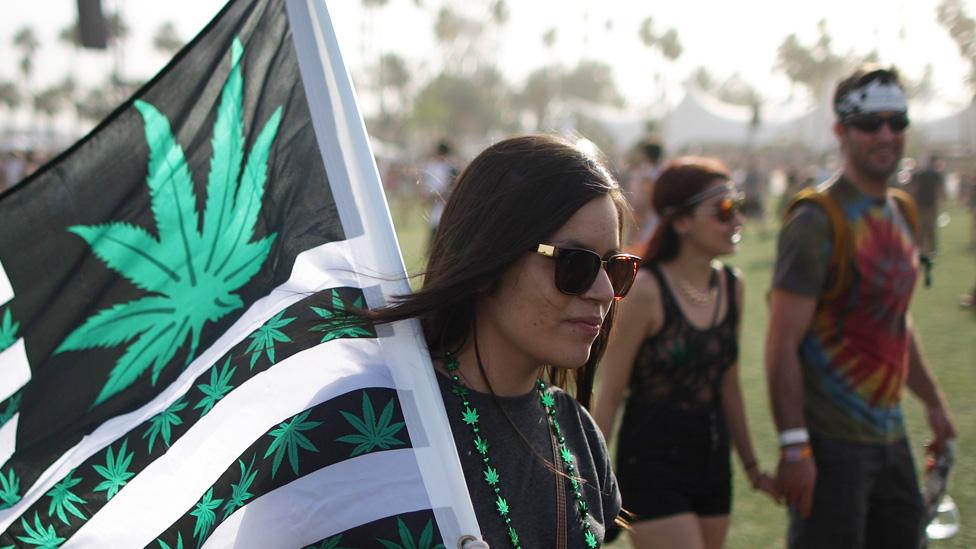Where ordering cannabis is easy as booking a taxi
- Published
- comments
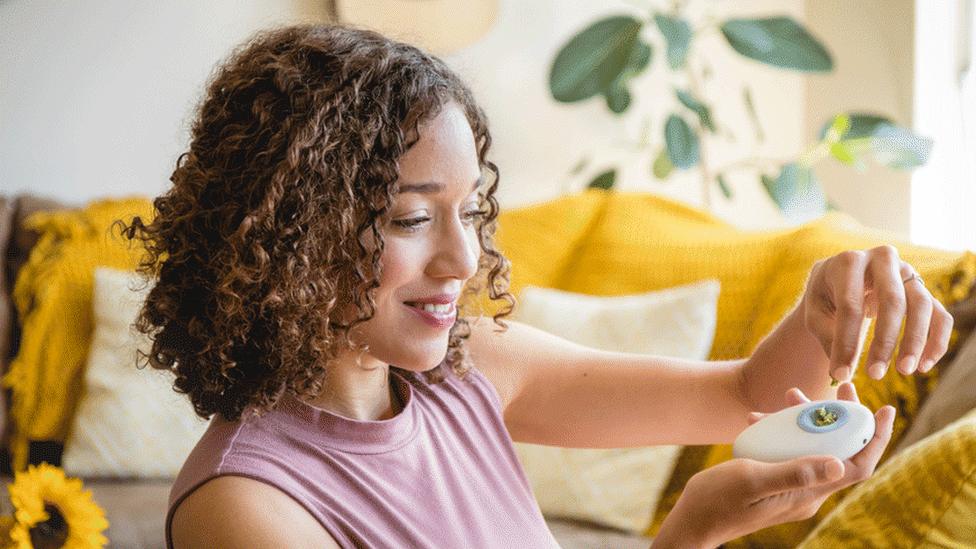
The recreational use of cannabis became legal in California in January 2018
Ordering cannabis in Los Angeles is now as easy as booking a taxi.
Click on an app, choose your preferred product, pay for it and then sit back and wait for it to be delivered to your door.
Eaze is just one of several firms taking advantage of the legalisation of cannabis, for which the people of California voted overwhelmingly in favour in 2016.
Since January last year, when the use of recreational cannabis became legal across the state, the start-up has seen an 80% increase in sign-ups.
It had run a limited medicinal cannabis delivery service since 2014, with anyone who wanted to order having to download medical evidence that they needed it.
But now the mood has changed and 10 states around the US have made recreational cannabis legal, with the use of the drug for medical reasons allowed in 33 of the 50 states.
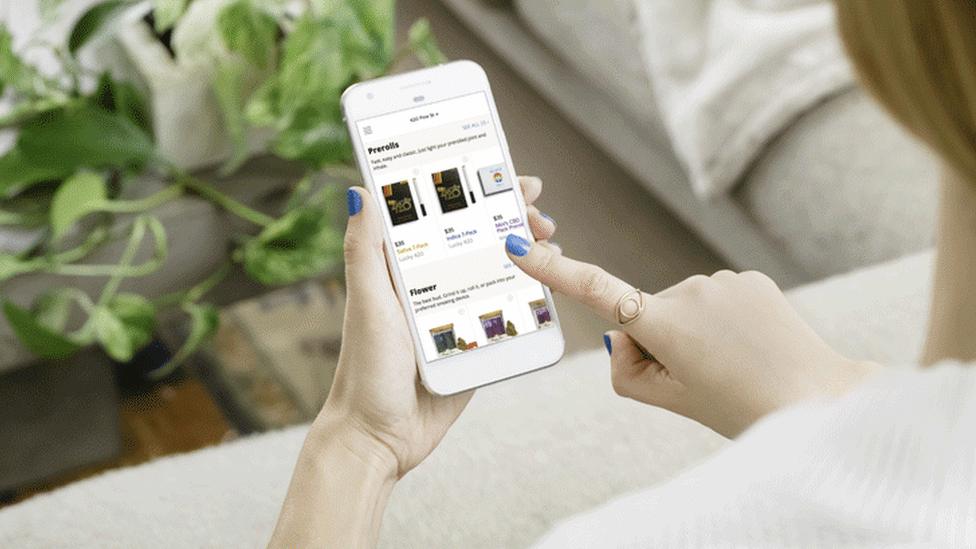
The app works like any other e-commerce site
"People used to consume with their friends and would have had a guy that delivered. Now a lot of people feel more comfortable about coming out of the shadows about their cannabis consumption," said Sheena Shiravi, director of communications at Eaze.
Not everyone is convinced about the new laws though, with doctors in the US and Canada - where it was also recently legalised - urging caution when it comes to usage, both in terms of addiction and the effects of the drug on the brain, particularly for young people.
Dr Romina Mizrahi, a doctor at Canada's Centre for Addiction and Mental Health, has done a lot of research into the link between cannabis use and psychosis. She believes it can be dangerous to smoke the drug under the age of 25.
"When people start smoking before the age of 16, there is a higher risk of having a psychotic experience. We know that early use is dangerous," she told the BBC.
Opiate crisis
According to Ms Shiravi, the vast majority of her company's users (80%) cite their use of the drug as being for general "wellness".
"It helps with stress levels, decreases alcohol consumption and cannabis is a lot safer than alcohol," she told the BBC.
For her, use of marijuana can also help alleviate the US's opiate crisis, which has seen addiction to shop-bought painkillers skyrocket.
"Cannabis is a huge tool missing in the toolbox of pain management. It is not a silver bullet but should definitely be considered in the face of hundreds of thousands of opioid deaths," she said.

Cannabis facts
Can cause confusion, anxiety and paranoia
If smoked with tobacco, can increase the risk of diseases like lung cancer
Regular use has been linked to an increased risk of psychotic illness
Used in some places to treat side effects of multiple sclerosis and cancer
Trials under way to look at how it might be used to treat other conditions including epilepsy and HIV/Aids
Source: NHS Choices, external

Eaze describes itself as a technology platform that creates an ecosystem around the drug, aiming to become the "credible, trusted source for all things cannabis".
It currently has around a dozen retailers, and between 40 and 60 different brands of cannabis, all of which have been safety tested. The retailers employ the drivers but the buying process, the payment and the delivery can be done within the app.
There are checks to verify users are over 21 and also to ensure they only buy limited amounts per day.
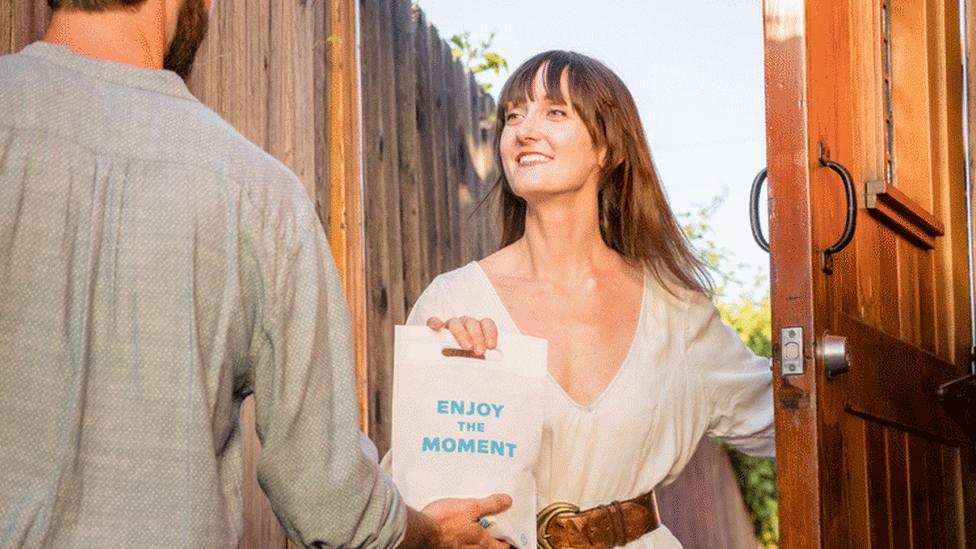
Thousands of deliveries are made around the state every week
A consumer uses the site in the same way they would use any e-commerce platform, picking the product they want, paying for it by credit card and then ordering a car to deliver it.
"It is just like shopping on Amazon or picking a movie on Netflix," said Ms Shiravi.
Gummy bears
In the company's offices in Venice Beach, there are three large screens that monitor in real-time the deliveries it makes. Exact numbers are confidential but judging by the amount of cars that appear to be making their way to destinations all over the state, business is healthy.
Ms Shiravi says that it makes "thousands of deliveries" each week.
Cannabis on the site is available in a variety of formats, from sprays to vaporisers to face creams, chocolates and gummy bears.
Smoking is still the most popular way to consume it, with vaporisers growing in popularity, according to Ms Shiravi.
There are hundreds of different chemical compounds in a cannabis plant - known as cannabinoids - and the amount of each is broken down on the descriptions of different products, so people know exactly what they are getting.
For those wanting to experience a high, products with a higher percentage of tetrahydrocannabinol (THC) are preferred, while those wanting something for stress or pain relief will look for products containing cannabidiol (CBD), which is non-psychoactive.
Edibles are also becoming increasingly popular.
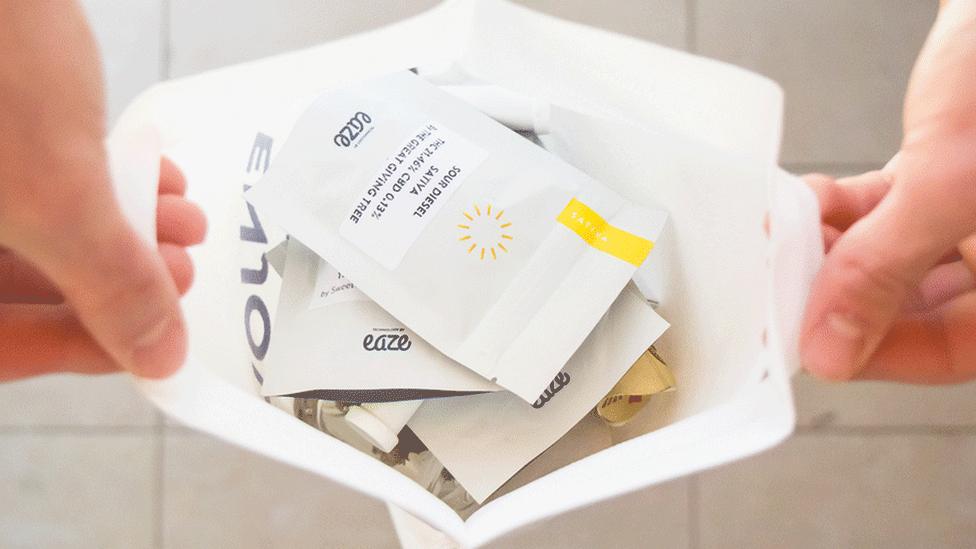
Products arrive in a childproof bag
"People might have had a really bad edible experience and ended up couch-locked because they did not know how much cannabis was in it.
"If someone in the past was cooking a (hash) brownie, it could have 25 to 30mg of cannabis flower, whereas we have products with as little as 5mg, which is a huge difference. The motto is 'start low and go slow'."
High tax
The products Eaze sells range from $15 (£12) to $50, but are then hit with an additional 20% to 40% tax rate, depending on jurisdiction.
"Our biggest competition is still the illicit market. One in five people are still shopping from there because of the taxes," said Ms Shiravi.
First quarter revenue from cannabis taxes in California totalled $34m - well below what was needed to be on track for the $1bn in yearly revenue, it had forecast.
Under state rules, individuals are only allowed to purchase a limited amount of cannabis per day and this is enforced on the app.
Everyone is also ID-checked - both when they sign up for an account and when a product is delivered - to ensure that they are 21 or older, and products arrive in a childproof package to help prevent unwanted accidents.
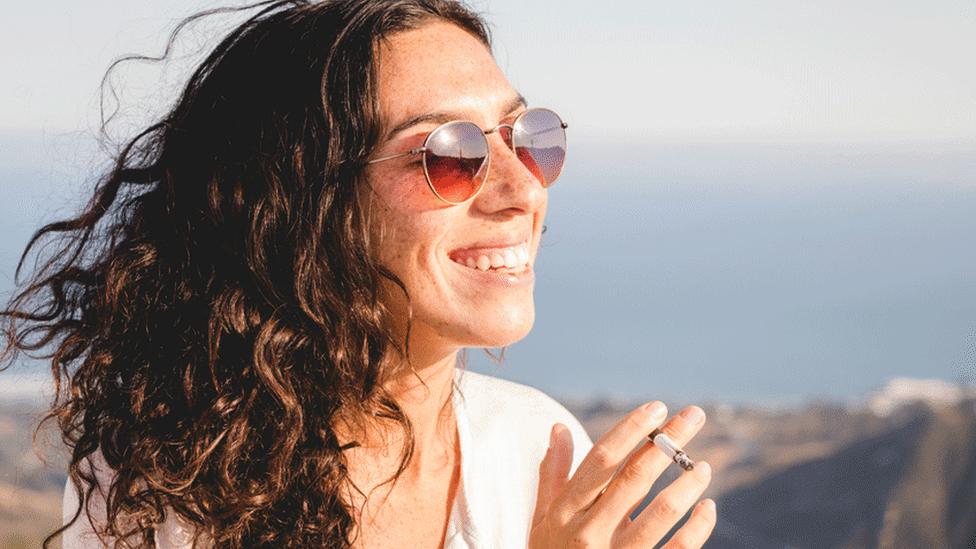
The fastest-growing number of users is women, said one retailer
For retailers, platforms such as Eaze have transformed the way they do business.
Sky Siegel is the general manager of Perennial Holistic Wellness Center, a shop selling cannabis products in Los Angeles. He now has clients all over the city.
And now the app collates data about what people are buying, he is beginning to see how different clients want different things, based on where they live, their age and gender.
So, for example, people living on the coast in California order different products to those living in downtown LA.
"Artists want to use it to give themselves creative cerebral inspiration whereas working-class clients are looking for something to help them relax at the end of a long day."
Women are the fastest growing demographic, he told the BBC.
The biggest issue for him and the other retailers is the finance model now that cannabis selling has moved from a cash economy to credit or debit card purchases.
Because cannabis is not legal at a national level in the US, many banks refuse to finance such selling, or drop retailers once they find out what they sell. It has left people like Mr Siegel playing banking whack-a-mole.
"We have to change banks every three months. If the state doesn't do something, or something happens at a federal level, we will run out of banks," he told the BBC.
Despite this, he does see platforms such as Eaze as continuing to flourish.
"Delivery is the future and we foresee unprecedented growth," he said.

- Published19 June 2018
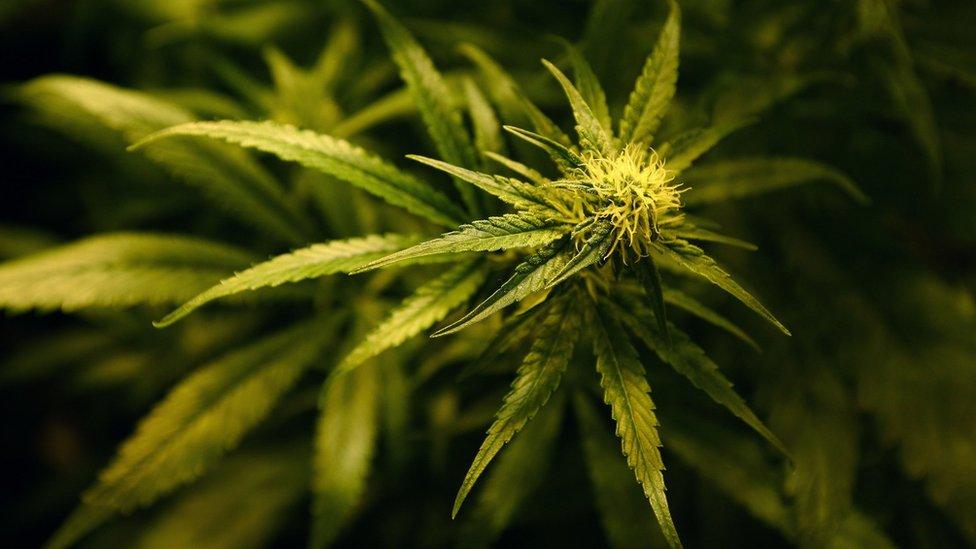
- Published11 December 2018
